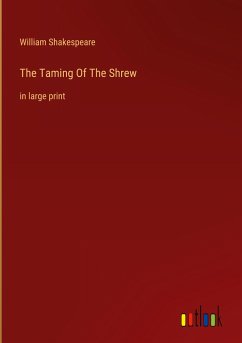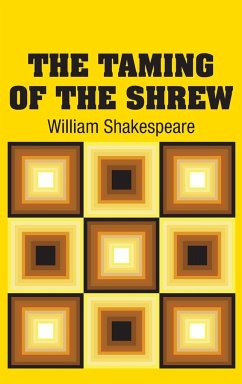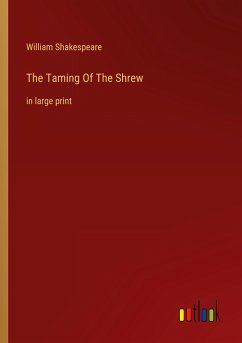
The Old Taming Of A Shrew
Upon Which Shakespeare Founded His Comedy (1844)
Herausgeber: Amyot, Thomas
Versandkostenfrei!
Versandfertig in 1-2 Wochen
21,99 €
inkl. MwSt.

PAYBACK Punkte
11 °P sammeln!
""The Old Taming Of A Shrew: Upon Which Shakespeare Founded His Comedy"" is a book written by Thomas Amyot and published in 1844. The book explores the origins of Shakespeare's play ""The Taming of the Shrew"" by examining an earlier version of the story called ""The Taming of a Shrew"" that was published in 1594. Amyot provides a detailed analysis of the similarities and differences between the two plays, highlighting the ways in which Shakespeare adapted and transformed the earlier version to create his own unique work. The book includes the full text of ""The Taming of a Shrew"" as well as ...
""The Old Taming Of A Shrew: Upon Which Shakespeare Founded His Comedy"" is a book written by Thomas Amyot and published in 1844. The book explores the origins of Shakespeare's play ""The Taming of the Shrew"" by examining an earlier version of the story called ""The Taming of a Shrew"" that was published in 1594. Amyot provides a detailed analysis of the similarities and differences between the two plays, highlighting the ways in which Shakespeare adapted and transformed the earlier version to create his own unique work. The book includes the full text of ""The Taming of a Shrew"" as well as a discussion of its historical and literary context. It is a valuable resource for anyone interested in the history of Shakespearean drama and the evolution of the English language.Reprinted From The Edition Of 1594, And Collated With The Subsequent Editions Of 1596 And 1607.This scarce antiquarian book is a facsimile reprint of the old original and may contain some imperfections such as library marks and notations. Because we believe this work is culturally important, we have made it available as part of our commitment for protecting, preserving, and promoting the world's literature in affordable, high quality, modern editions, that are true to their original work.












